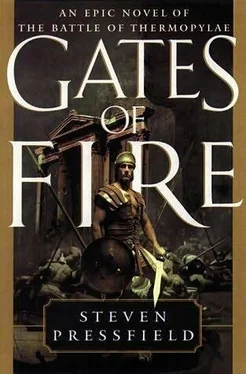Steven Pressfield - Gates of Fire - An Epic Novel of the Battle of Thermopylae
Здесь есть возможность читать онлайн «Steven Pressfield - Gates of Fire - An Epic Novel of the Battle of Thermopylae» весь текст электронной книги совершенно бесплатно (целиком полную версию без сокращений). В некоторых случаях можно слушать аудио, скачать через торрент в формате fb2 и присутствует краткое содержание. Жанр: Историческая проза, на английском языке. Описание произведения, (предисловие) а так же отзывы посетителей доступны на портале библиотеки ЛибКат.
- Название:Gates of Fire: An Epic Novel of the Battle of Thermopylae
- Автор:
- Жанр:
- Год:неизвестен
- ISBN:нет данных
- Рейтинг книги:3 / 5. Голосов: 1
-
Избранное:Добавить в избранное
- Отзывы:
-
Ваша оценка:
- 60
- 1
- 2
- 3
- 4
- 5
Gates of Fire: An Epic Novel of the Battle of Thermopylae: краткое содержание, описание и аннотация
Предлагаем к чтению аннотацию, описание, краткое содержание или предисловие (зависит от того, что написал сам автор книги «Gates of Fire: An Epic Novel of the Battle of Thermopylae»). Если вы не нашли необходимую информацию о книге — напишите в комментариях, мы постараемся отыскать её.
Gates of Fire: An Epic Novel of the Battle of Thermopylae — читать онлайн бесплатно полную книгу (весь текст) целиком
Ниже представлен текст книги, разбитый по страницам. Система сохранения места последней прочитанной страницы, позволяет с удобством читать онлайн бесплатно книгу «Gates of Fire: An Epic Novel of the Battle of Thermopylae», без необходимости каждый раз заново искать на чём Вы остановились. Поставьте закладку, и сможете в любой момент перейти на страницу, на которой закончили чтение.
Интервал:
Закладка:
The Spartans became for me the equivalent of avenging gods. I couldn't leam enough about these warriors who bad so devastatingly defeated the murderers of my mother and father, the violators of my innocent cousin. No stranger we met escaped my boyish grilling. Tell me about Sparta.
Her double kings. The three hundred Knights who protected them. The agoge which trained the city's youth. The syssiria, the warriors' messes. We heard a tale of Kleomenes. Someone had asked the king why he did not raze Argos once and for all when his army had stood at the gates and the city lay prostate before him. We need the Argives, Kleomenes responded. Who else will our young men train on?
In the winter hills we were starving. Bruxieus was getting weaker. I took to stealing. Diomache and I would raid a shepherd's fold at night, fighting off the dogs with sticks and snatching a kid if we could. Most of the shepherds carried bows; arrows would whiz past us in the dark. We stopped to grab them and soon had quite a cache. Bruxieus hated to see us turning into thieves.
We got a bow one time, snagging it right out from under a sleeping goatherd's nose. It was a man's weapon, a Thessalian cavalry bow, so stout that neither Diomache nor I could draw it.
Then came the event which changed my life and set it on the course that reached its terminus at the Hot Gates.
I got caught stealing a goose. She was a fat prize, her wings pegged for market, and I got careless going over a wall. The dogs got me. The men of the farm dragged me into the mud of the livestock pen and nailed me to a hide boatd the size of a door, driving tanning spikes through both my palms. I was on my back, screaming in agony, while the farm men lashed my kicking, flailing legs to the board, vowing that after lunch they would castrate me like a sheep and hang my testicles upon the gate as a warning to other thieves. Diomache and Bruxieus crouched, hidden, up the hillside; they could hear everything… ere the captive drew up in his narration. Fatigue and the I ordeal of his wounds had taken severe toll of the man, or perhaps, his listeners imagined, it was memory of the instance he was recounting. His Majesty, through the captain Orontes, inquired of the prisoner if he required attention. The man declined. The hesitation in the tale, he declared, arose not from any incapacity of its narrator, but at the prompting of the god by whose inner direction the order of events was being dictated, and who now commanded a momentary alteration of tack. The man Xe-ones resettled himself and, granted permission to wet his throat with wine, resumed.
Two summers subsequent to this incident, in Lakedaemon, I witnessed a different kind of ordeal: a Spartan boy beaten to death by his drill instructors.
The lad's name was Teriander, he was fourteen; they called him Tripod because no one of his age-class could take him down in wrestling. Over the succeeding years I looked on in attendance as two dozen other boys succumbed beneath this same trial, each like Tripod disdaining so much as a whimper in pain, but he, this lad, was the first.
The whippings are a ritual of the boys' training in Lakedaemon, not in punishment for stealing food (at which exploit the boys are encouraged to excel, to develop resourcefulness in war), but for the crime of getting caught. The beatings take place alongside the Temple of Artemis Orthia in a narrow alley called the Runway. The site is beneath plane trees, a shaded and quite pleasant space in less grisly circumstances.
Tripod was the eleventh boy whipped that day. The two eirenes, drill instructors, who administered the beatings, had already been replaced by a fresh pair, twenty-year-olds just out of the agoge and as powerfully built as any youths in the city. It worked like this: the boy whose turn it was grasped a horizontal iron bar secured to the bases of two trees (the bar had been worn smooth by decades, some said centuries, of the ritual) and was flogged with birch rods, as big around as a man's thumb, by the eirenes taking turns. A priestess of Artemis stood at the boy's shoulder, presenting an ancient wooden image which must, tradition dictated, receive the spray of human blood.
Two of the boy's mates from his training platoon kneel at each shoulder to catch the lad when he falls. At any time the boy may terminate the ordeal by releasing the bar and pitching forward to the dirt. Theoretically a boy would only do this when thrashed to unconsciousness, but many pitched simply when they could no longer bear the pain. Between a hundred and two hundred looked on this day: boys of other platoons, fathers, brothers and mentors and even some of the boys' mothers, keeping discreetly to the rear.
Tripod kept taking it and taking it. The flesh of his back had been torn through in a dozen places; you could see tissue and fascia, rib cage and muscle and even the spine. He would not go down.
Pitch! his two comrades kept urging between blows, meaning let go of the bar and fall. Tripod refused.
Even the drill instructors began hissing this between their teeth. One look in the boy's face and you could see he had passed beyond reason. He had made up his mind to die rather than raise the hand for quarter. The eirenes did as they were instructed in such cases: they prepared to wallop Tripod so hard in four rapid successive blows that the impact would knock him unconscious and thus preserve his life. I will never forget the sound those four blows made upon the boy's back.
Tripod dropped; the drill instructors immediately declared the ordeal terminated and summoned the next boy.
Tripod managed to lift himself upon all fours. Blood was sheeting from his mouth, nose and ears.
He could not see or speak. He managed somehow to turn about and almost stand, then he sank slowly to his seat, held there a moment and then dropped, hard, into the dirt. It was clear at once that he would never rise.
Later that evening when it was over (the ritual was not suspended on account of Tripod's death but continued for another three hours), Dienekes, who had been present, walked apart with his protege, the boy Alexandras whom I mentioned earlier. I served Alexandros at this time. He was twelve but looked no older than ten; already he was a won' derful runner, but extremely slight and of a sensitive disposition. Moreover he had shared a bond of affection with Tripod; the older boy had been a sort of guardian or protector; Alexandros was devastated by his death.
Dienekes walked with Alexandras, alone except for his own squire and myself, to a spot beneath the temple of Athena Protectress of the City, immediately below the slope from the statue of Phobos, the god of fear. At that time Dienekes' age was, I would estimate, thirty-five years. He had already won two prizes of valor, at Erythrae against the Thebans and at Achillieon against the Corinthians and their Arkadian allies. As nearly as I can recall, this is how the older man instructed his protege: First, in a gentle and loving tone, he recalled his own first sight, when he was a lad in years younger even than Alexandros, of a boy comrade whipped to death. He recounted several of his own ordeals in the Runway, beneath the rod.
Then he began the sequence of query and response which comprises the Lakedaemonian syllabus of instruction.
Answer this, Alexandros. When our countrymen triumph in battle, what is it that defeats the foe?
The boy responded in the terse Spartan style, Our steel and our skill.
These, yes, Dienekes corrected him gently, but something more. It is that. His gesture led up the slope to the image of Phobos.
Fear.
Their own fear defeats our enemies.
Now answer. What is the source of fear?
When Alexandros I reply faltered, Dienekes reached with his hand and touched his own chest and shoulder.
Fear arises from this: the flesh. This, he declared, is the factory of fear.
Читать дальшеИнтервал:
Закладка:
Похожие книги на «Gates of Fire: An Epic Novel of the Battle of Thermopylae»
Представляем Вашему вниманию похожие книги на «Gates of Fire: An Epic Novel of the Battle of Thermopylae» списком для выбора. Мы отобрали схожую по названию и смыслу литературу в надежде предоставить читателям больше вариантов отыскать новые, интересные, ещё непрочитанные произведения.
Обсуждение, отзывы о книге «Gates of Fire: An Epic Novel of the Battle of Thermopylae» и просто собственные мнения читателей. Оставьте ваши комментарии, напишите, что Вы думаете о произведении, его смысле или главных героях. Укажите что конкретно понравилось, а что нет, и почему Вы так считаете.












